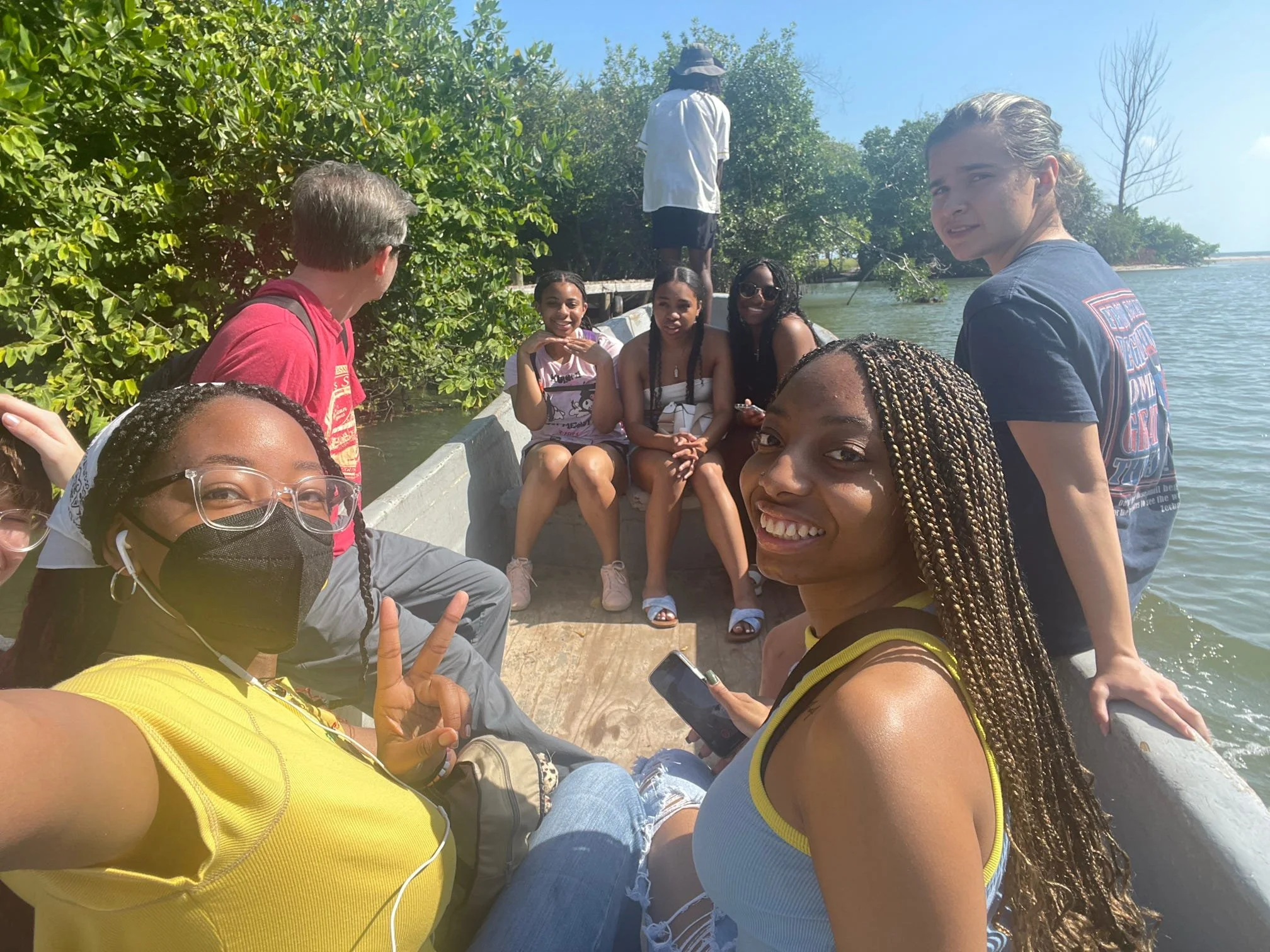What You Need to Know Before Studying Abroad
/Each year, 5 million students around the world enroll in study abroad programs in search of new learning opportunities and rich cultural experiences.
Of course, studying abroad is a serious undertaking—whether you’re an organizing faculty member or a participating student, it’s normal to have some reservations.
That’s why we’ve answered the following questions: what is study abroad? And how does it work?
What is Study Abroad?
Studying abroad allows students to get their education in foreign country. Students receive academic credit but within a different cultural setting at a foreign university or in the field.
During their time in their new country, international students may attend lectures, carry out research and other types of field work, and most importantly, engage with people from different cultural backgrounds. The connection to local people is often the highlight and the most important part of the international education experience.
There are several different types of study abroad. These include:
Exchange - where a student studies at a foreign institution that is partnered with their university, typically for one semester;
Direct enrollment - where a student enrolls in a full program at a foreign institution;
Third-party - where a student enrolls on a program that is organized by a third party;
Faculty-led - where the study program is headed by a faculty member and is tailored to their needs, this with what Learn from Travel most commonly provides;
Virtual - where the student accesses international education resources and learning opportunities online. Learn from Travel also offers these kinds of programs.
While students’ motivations for studying abroad vary—from making new friends to learning a foreign language—international education invariably plays a formative role in their personal growth.
How does Studying Abroad Work?
Studying abroad sounds great in principle, but how does it actually work in practice?
Who Organizes Study Abroad Programs?
In most cases, students enroll in study abroad programs through their institution. Most universities have partnerships with other international institutions, allowing them to exchange students. Sometimes, universities participate in government-led study abroad initiatives.
Study programs organized through a university grant college credit for courses completed at the foreign institution so that students can continue working towards their degree. The university may also help with living arrangements in the host country.
Where a student is unable to study abroad through their institution, they can still enroll in a study abroad course through a third-party provider. These organizations are well connected with travel operators and will arrange all aspects of the study abroad experience.
In cases when students participate in faculty-led or virtual-programs, they usually enroll in a class on their home campus that has a travel and/or virtual component.
How are Study Abroad Programs Funded?
Tuition fees for studying abroad can vary greatly. In some parts of the world, international students may face no entrance fees at all. However, even in these cases, there are many other costs to consider such as rent, living expenses, and travel costs.
Financial support is available through scholarships offered by governments, businesses, foundations, and universities. Scholarships can be merit-based on need-based. In some cases, they will cover the entire costs of the study abroad program and don’t have to be paid back.
Student loans represent a more accessible form of funding. However, these have to be paid back. Faculty-led and virtual study abroad programs allow students to reap the rewards of an international education without breaking the bank.
How do Study Abroad Programs Vary?
Study abroad programs vary in terms of location, content, duration, costs, eligibility requirements, and living arrangements. Typically, a study abroad program will last for one semester, although it’s not uncommon for them to take place over a full academic year.
The characteristics of the study abroad program usually depend on the organizing institution. For example, a university may have strong links to a particular part of the world or an emphasis on a specific area of study—its available programs will likely reflect these.
Studying abroad through a third-party provider can offer a greater level of freedom for participants to follow their own path.
Faculty-led study abroad programs represent a shorter and more personalized alternative to institutional study abroad programs.
How does Studying Abroad Benefit Students?
There is increasing consensus among students, educators, and HR professionals expressing the value of studying abroad in a new culture. Here are the five main benefits:
Develop language skills
Research from linguists shows that studying abroad is highly productive for language learning when the student is disciplined with their language studies and immerse themselves in the host country.
Building a daily habit of speaking in a foreign language is the best way to achieve fluency.
Even study abroad students with little ambition of learning a new language tend to pick up some expressions during their time in a foreign country.
Build intercultural competence
By exploring other cultures and interacting with the people that comprise them, study abroad students develop their intercultural competence.
This refers to the ability to communicate effectively and appropriately with people from different cultural backgrounds. It’s an essential skill in the most culturally diverse societies, where intercultural interactions are an everyday occurrence.
Enhance career opportunities
International education always looks good on a C.V. and can help graduates to gain an advantage in the job market. Studying in a different country demonstrates to future employers a number of important soft skills including adaptability, communication, and open-mindedness.
In fact, 64% of employers consider studying abroad a desirable experience. Particularly for roles at multinational corporations with diverse staff and clients, the cultural skills that come with studying abroad are looked on favorably by hiring managers.
Grow self-confidence
Most students returning from studying abroad say that the experience had a positive impact on their self-confidence. Research from Leuphana University Lüneburg formalizes the link between study abroad and self-efficacy.
It’s hardly surprising; leaving behind your comfort zone for new friends in a different culture will make obstacles in later life seem easy. The unfamiliarity of studying abroad breeds confidence that young people can take forward into the workplace and in their social life.
See the world
Study abroad allows you to see the world beyond your home country, often igniting a passion for travel that graduates chase for the rest of their lives.
In your time off, dive into the host culture by visiting famous landmarks. You can even take a weekend trip to a neighboring country! This process of exploration will lead to new interests and expand your worldview.
How to Plan your Study Abroad Trip
Studying abroad requires a lot of planning. We’ve broken down the process into four simple stages that will help you to get the most out of your study abroad experience.
Finding a Provider
As a college or university student, your first step is to reach out to your international education office. Staff trained in arranging study abroad programs will explain the options available to you and offer advice on how to select the right course based on your interests.
If your institution does not operate an exchange program, speak with your favorite faculty members about the possibility of organizing a short-term, highly specialized study abroad program. Learn from Travel works with professors to plan programs tailored to their subject areas.
Choosing a destination
The next step is to create a shortlist of countries or (even better) cities where you would like to study. Factors that might influence your decision include cultural experiences, language proficiency, or quality of educational institutions.
There are also a few practical considerations you need to make. Think about the cost of living and access to services in each location and shortlist locations based on your personal requirements.
Selecting a study program
Once you’ve narrowed down your locations, you can begin to browse study abroad programs at specific institutions. Look for interesting programs that will add to your professional development.
Besides tuition fees, dig deep into your prospective universities by researching their campus resources, academic connections, and student support services. Remember to use multiple sources when carrying out research on each institution.
Preparing for the trip
You’ve finally settled on your program, but there are still plenty of things to sort out. Most importantly are your travel arrangements and accommodation. Generally, your provider will be able to help you out with these two areas.
Financing your trip can be challenging, so check if you are eligible for any study scholarships. Creating a budget will also go a long way to keeping costs down. Finally, we recommend learning some basic foreign language skills to help you with social interactions.
Are You Ready to Study Abroad?
With the right planning and an open mind, studying abroad promises a life-changing experience for young people.
Now that you know exactly what study abroad is, are you ready to start your own adventure? Take a look at Learn from Travel’s educational travel services now!



























